Key takeaways:
- Distributors play a crucial role in connecting filmmakers to audiences and influencing a film’s success through strategic marketing and relationships with exhibitors.
- Tailored pitches and genuine connections are essential when approaching distributors; understanding their focus and engaging in informal discussions can foster collaboration.
- Building trust with distributors involves consistent communication, transparency about challenges, and being open to feedback, which strengthens partnerships over time.
- Maintaining long-term relationships requires appreciation, regular follow-ups, and shared celebrations of successes, reinforcing emotional ties beyond business transactions.
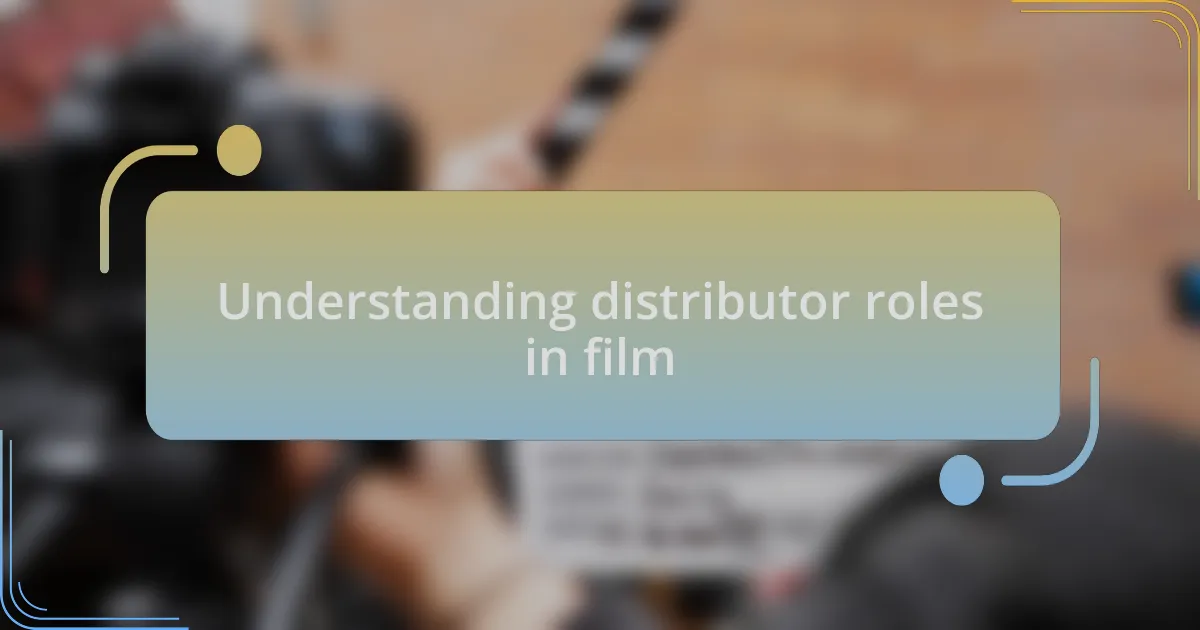
Understanding distributor roles in film
Distributors are the vital link between the filmmakers and the audience. They not only decide where and how a film will be shown, but they also shape marketing strategies to ensure that the film reaches its target audience effectively. I remember feeling a mix of excitement and anxiety during my first meeting with a distributor; their insights into audience trends were eye-opening.
It’s fascinating to realize how varied distributor roles can be. Some specialize in theatrical releases, while others focus on streaming platforms or international markets. In one of my projects, I learned firsthand how a distributor’s understanding of regional tastes can transform a film’s reception. It’s essential to ask, how well do you understand the market you’re entering?
Moreover, a distributor’s relationships with exhibitors can greatly influence a film’s success. Their ability to secure prime screening slots often makes the difference between a box office hit and a missed opportunity. Reflecting on past experiences, I’ve seen how effective communication with distributors can lead to innovative promotional ideas, making the process feel like a collaborative journey rather than a transaction.
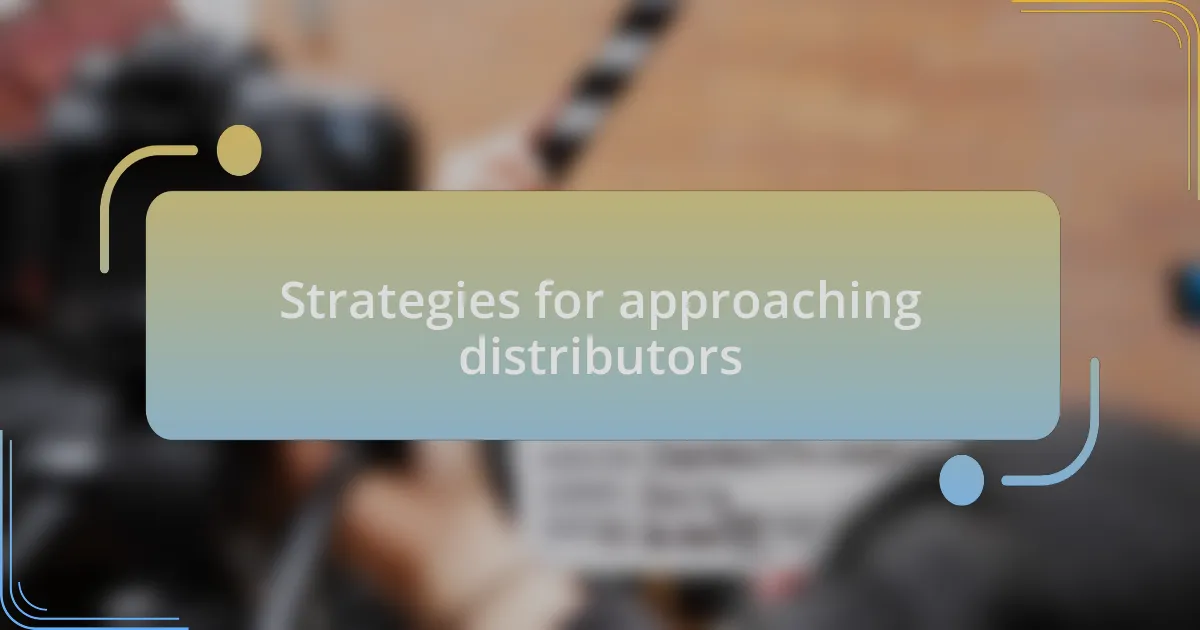
Strategies for approaching distributors
When approaching distributors, it’s crucial to have a tailored pitch that resonates with their specific goals. I learned this the hard way when I casually presented my film to a distributor who typically focused on family-friendly content, neglecting to highlight the comedy elements. It taught me to do thorough research beforehand — how aligned is my film with their past projects?
Building genuine connections is another key strategy. I remember attending a film festival and engaging in casual conversations with distributors over coffee. Those relaxed moments allowed me to understand their perspectives and preferences, transforming our interaction from formal to friendly. Isn’t it interesting how a conversation can set the tone for future collaborations?
Follow-up communication plays an equally significant role in maintaining relationships with distributors. After I submitted my project, I made it a point to send a personalized thank-you email, emphasizing elements of our discussion. This small gesture opened doors for additional questions and feedback, creating a dialogue that extended beyond that initial meeting. How can small actions lead to bigger opportunities?
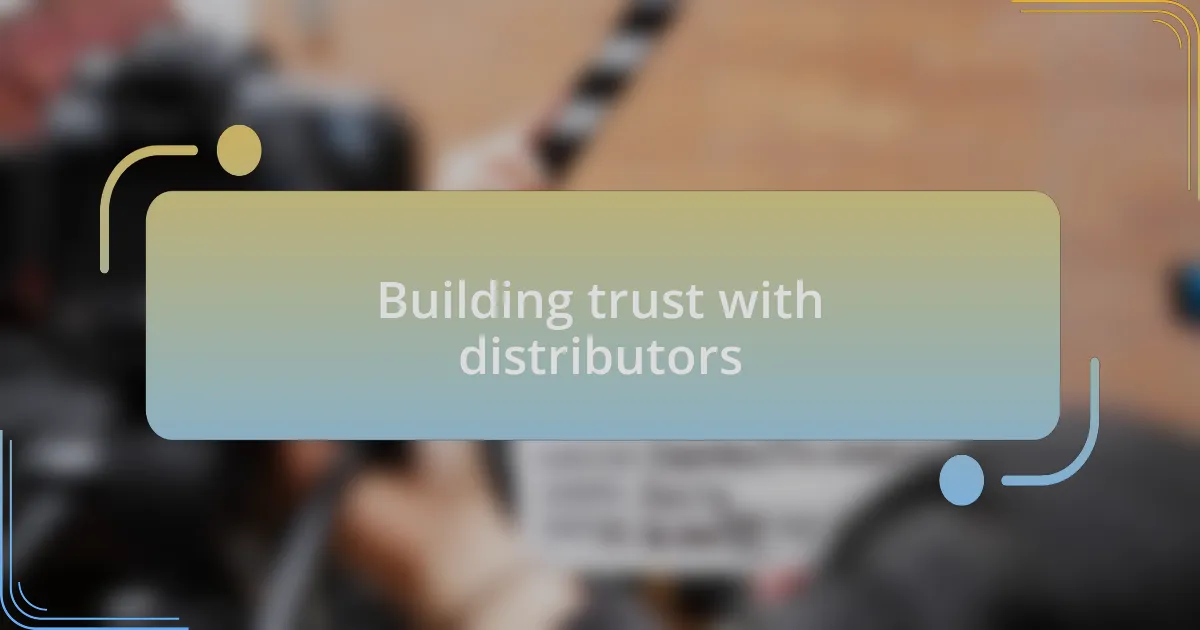
Building trust with distributors
Building trust with distributors is vital for a successful partnership. I once worked with a distributor who had a reputation for being selective. Rather than simply pitching my film, I took the time to meet with them regularly to share insights about the project and my vision. This transparency created a sense of trust and familiarity that made them more comfortable supporting my work.
In my experience, consistency is key in nurturing these relationships. I recall a time when I reached out with updates on my film’s progress, even when there was no immediate news to share. This proactive communication reassured them that I was committed and serious about our collaboration. Trust builds over time, and these little gestures have made a big difference in how distributors view our partnership.
I’ve also learned that being open to feedback is essential. When a distributor offered constructive criticism on my film’s marketing approach, I initially felt defensive. However, I chose to listen and adapt, which ultimately strengthened our relationship. This experience taught me that vulnerability can be a powerful tool in fostering collaboration. How many times have we let our egos get in the way of trust?
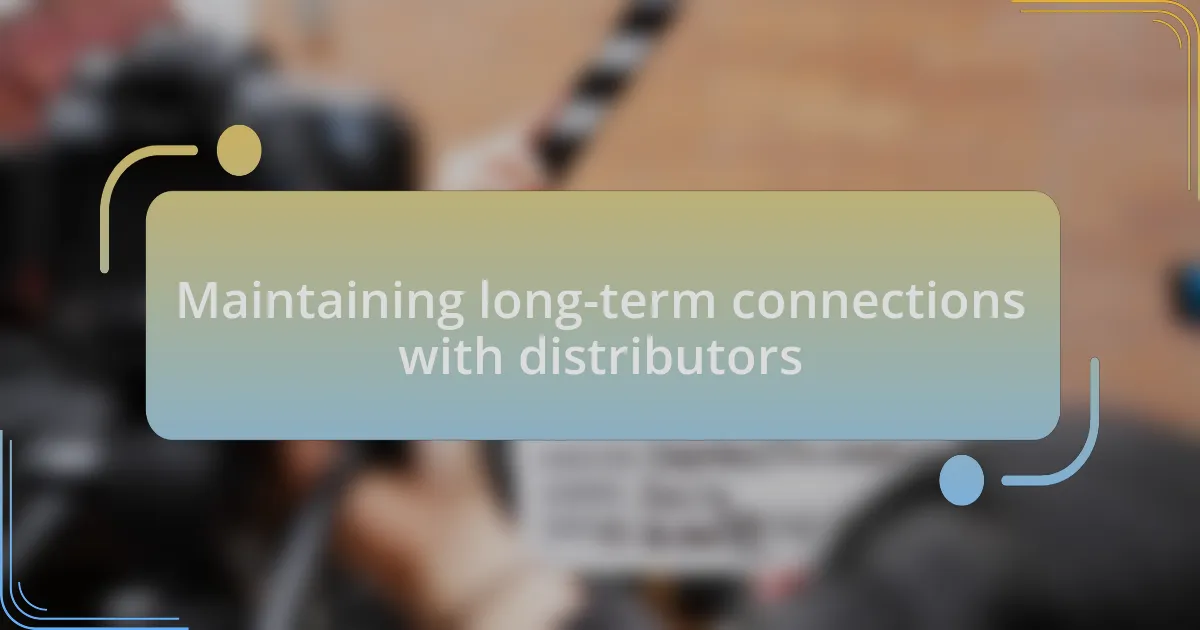
Maintaining long-term connections with distributors
Maintaining strong connections with distributors requires ongoing engagement and appreciation. I remember the pivotal moment when I invited a distributor to a screening of my latest film. It wasn’t just about showcasing my work; it was an opportunity to express gratitude for their continued support. It’s incredible how such gestures can turn a transactional relationship into a genuine partnership.
Regular follow-ups play a crucial role too. There was a period when I dedicated some time each month to check in, not just for business but to ask about their projects and share industry trends. This small effort made them feel valued beyond our contract. Have you ever noticed how people appreciate being recognized as more than just a business connection?
Additionally, celebrating milestones together can solidify that bond. When my film received recognition at a festival, I made sure to include my distributor in the celebrations. This shared success created an emotional tie that money can’t buy. What better way to reinforce a relationship than by making them feel like an integral part of your journey?
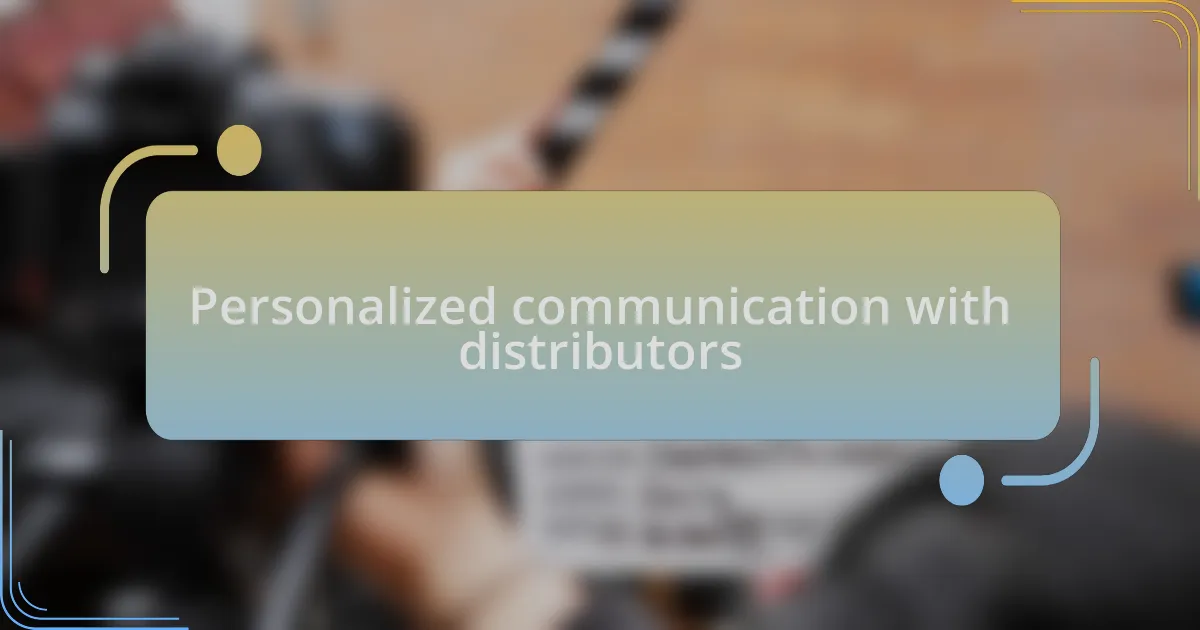
Personalized communication with distributors
I’ve found that personalized communication is key when engaging with distributors. One approach I took was to send them tailored updates, highlighting how their specific contributions influenced the success of my projects. A simple acknowledgment of their role made them feel invested in the journey, creating a sense of ownership and pride in the work we accomplished together.
Another experience that stands out to me is when I took the time to remember personal details about my distributors. If a distributor mentioned a family member’s milestone or a personal passion during our conversations, I would follow up later with a message or even a small token, like a book related to their interest. This practice reinforced that I valued them not merely as business partners but as individuals with their own stories.
During a particularly challenging project, I reached out to a distributor to discuss not just the hurdles, but also to ask for their insights. Their input was invaluable, and it was gratifying to see how a simple conversation could transform our dialogue from routine transactions into a meaningful exchange of ideas. How often do we forget that a thoughtful conversation can be a bridge to stronger partnerships?

Lessons learned from my experiences
One significant lesson I learned is the importance of showing appreciation consistently. I once organized a small gathering for my distributors after a successful project. Seeing their smiles and hearing their laughter while we reminisced about our collaboration was a powerful reminder that our relationships extend beyond business deals. It highlighted the value of celebrating our successes together, creating lasting bonds that transcended mere transactions.
I also discovered the power of being transparent about challenges. During a tough negotiation, I openly shared my concerns with a distributor. Instead of creating distance, this honesty fostered a sense of teamwork. It made me realize that vulnerability can actually strengthen relationships. Why do we often hesitate to share our struggles? In my experience, admitting when things aren’t perfect can invite collaboration rather than conflict.
Building relationships isn’t just about business; it’s about trust and mutual respect. One time, a distributor called to ask for a last-minute change in our agreement. Instead of reacting defensively, I took a pause, listened to their perspective, and found a compromise that was beneficial for both of us. In that moment, I understood that flexibility works wonders in nurturing strong partnerships. How often do we consider the other person’s needs when negotiating? I believe this mindset is crucial for fostering deep, collaborative relationships.